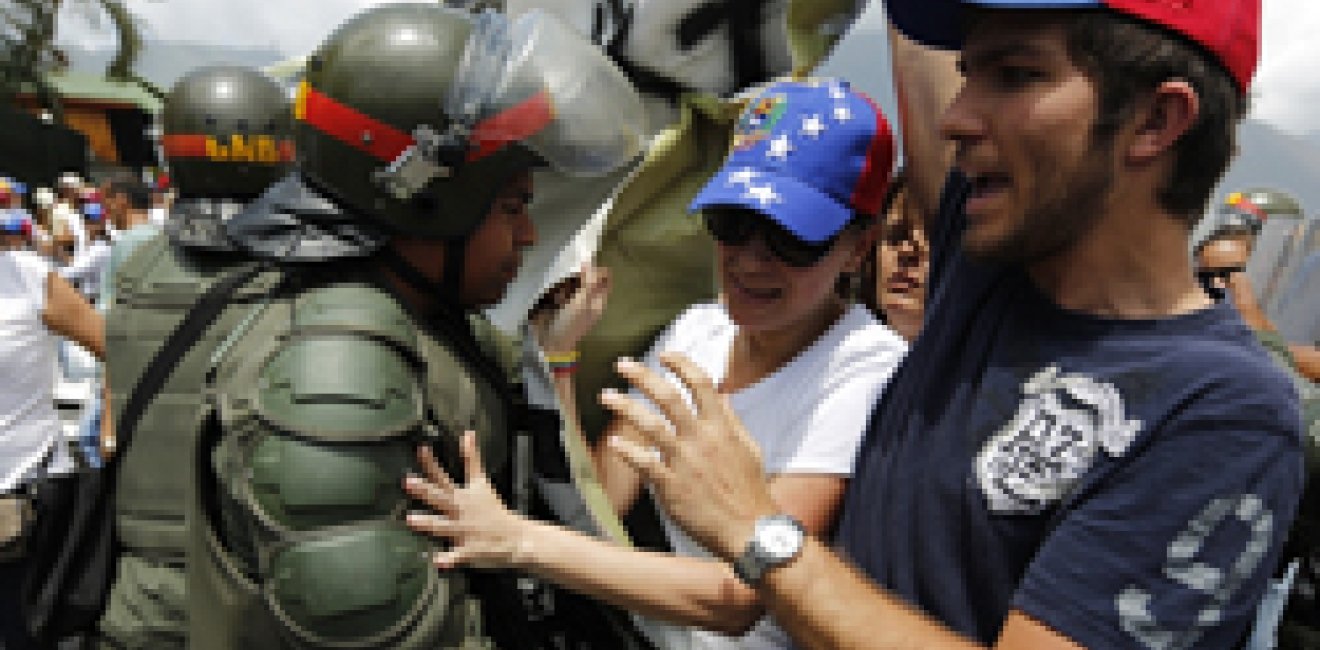The Crisis in Venezuela: What Role for the International Community?
Four regional experts wrestle from distinct angles with the core question of how to play a constructive role in overcoming and resolving tensions in Venezuela.
Four regional experts wrestle from distinct angles with the core question of how to play a constructive role in overcoming and resolving tensions in Venezuela.

As the Venezuelan crisis continues into its fourth week, actors in the international community have struggled to define an appropriate response that takes into account the country’s deep polarization, Venezuela’s constitutional processes, and the potential for greater violence and unrest.
To reflect on the role that international institutions and other nations of the Western Hemisphere could or might adopt, the Latin American Program commissioned four short opinion pieces from regional experts who wrestle from distinct angles with the core question of how to play a constructive role in overcoming and resolving tensions in Venezuela.
How to Aid Venezuela by Juan Gabriel Tokatlian
The on-going, very tense, extremely complex, and potentially destabilizing anti- and pro-government demonstrations in Venezuela constitute a real challenge in the Americas. The elected president of the most radical administration in the Western Hemisphere, Nicolás Maduro, is facing gargantuan difficulties, both socio-economic and political and mostly as a result of his own mistakes. At the same time, the opposition forces, currently led by former mayor Leopoldo López, seem eager to exacerbate the situation even further, something which may eventually culminate in an unprecedented political meltdown.
Read the full piece here>>>
Only Dialogue Can Change the Dynamics of Confrontation by The Honorable José Miguel Insulza
Today’s political crisis in Venezuela reveals profound divisions at the heart of Venezuelan society that can only be resolved by that country’s authorities, institutions, political forces, and citizens. The path to a solution must be found through frank and open dialogue between the principal actors of the government and the opposition concerning the serious economic and political problems that afflict Venezuela.
Read the full piece here>>>
Thoughts on A U.S. Response to the Venezuelan Crisis by Philip French
As popular resistance to a repressive and corrupt regime continues to grow, it is important to remember many Venezuelans still support President Nicolás Maduro and/or his government. After all, it was corruption and a mostly poor and alienated population ignored by traditional elites that brought Hugo Chávez to power 15 years ago. This government, first under Chávez and now Maduro, has grossly, perhaps criminally, squandered both an unprecedented political mandate and unprecedented oil income.
Read the full piece here>>>
What is Behind Brazil’s Timid Approach to Protests in Venezuela? by Paulo Sotero
The contrast between the Brazilian Foreign Ministry’s criticism of the crackdown on protesters in Kiev and the cautious statement released as protests spread in Venezuela was highlighted in commentary published in the Brazilian media last week that was critical of Dilma Rousseff’s timid foreign policy, in contrast to the active diplomacy during the Lula administration.


The Wilson Center’s prestigious Latin America Program provides non-partisan expertise to a broad community of decision makers in the United States and Latin America on critical policy issues facing the Hemisphere. The Program provides insightful and actionable research for policymakers, private sector leaders, journalists, and public intellectuals in the United States and Latin America. To bridge the gap between scholarship and policy action, it fosters new inquiry, sponsors high-level public and private meetings among multiple stakeholders, and explores policy options to improve outcomes for citizens throughout the Americas. Drawing on the Wilson Center’s strength as the nation’s key non-partisan policy forum, the Program serves as a trusted source of analysis and a vital point of contact between the worlds of scholarship and action. Read more
